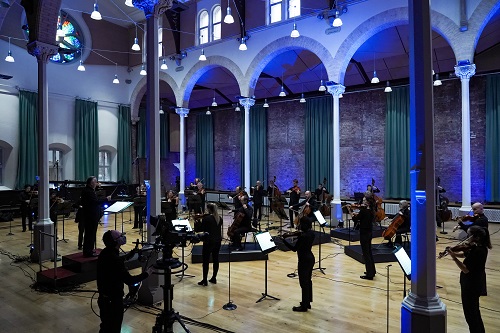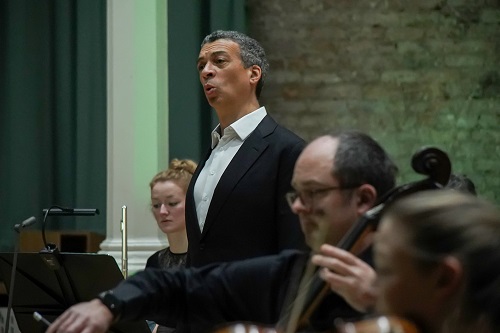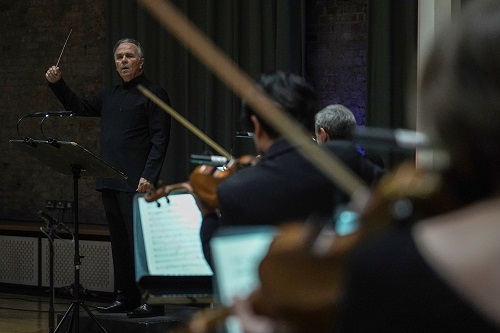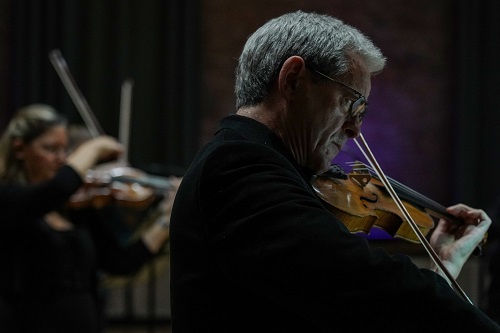Roderick Williams has had a busy pandemic. The last couple of weeks alone have seen the baritone joining with VOCES8 for a concert in their Live from London – Christmas series; performing Schubert’s Schwanengesang with his regular collaborator, pianist Susie Allan; and, singing with the Hallé in one of their Manchester homes, Hallé St Peter’s in Ancoats.
The latter was the second concert in the Hallé’s nine-concert Winter Season, which is being streamed from The Bridgewater Hall and St. Peter’s between December and March 2021. They began in sombre fashion with Britten’s Russian Funeral, which was written by the then 22-year-old composer for the London Labour Choral Union and premiered in 1936 in Westminster Theatre, by South London Brass Orchestra under the baton of Alan Bush. The work was originally titled, War and Death, and it lays Britten’s pacifist cards on the table. The 4 horns, 3 trumpets, 3 trombones, tuba and percussion begin with a bitter, dark march based on a Russian revolutionary tune ‘Vy zhertvoiu pali’ (‘You fell as victims’) which was used to honour those who died at the Tsar’s Winter Palace in 1905 – a song which was later used by Shostakovich in the slow movement of his Eleventh Symphony.

Sir Mark Elder didn’t let the mourners drag their feet. The opening death march was taut, full of repressed anger, as the trombone sank low, and the quiet, percussive rat-a-tat seemed almost spat out through clenched teeth. The central section, trumpets muted, was a sardonic sneer, the anger now released as the biting rhythms built towards the return of the march, played by the resolute, precise unison horns urged on by a swelling percussive weight, and trombone and trumpet countermelodies. The loud snarl which Elder drew from the ensemble at the close seemed to foreshadow of the Revolution to come, after that ‘Red Sunday’ in 1905.
Bells for the dead tolled, too, at the start of Arvo Pärt’s Cantus in Memory of Benjamin Britten. Again, Elder established momentum from the start, encouraging the standing string players of the Hallé to create truly pulsing waves from their overlapping descents. Not so much ethereal as open, honest, raw even, the shining rich string haze seemed to articulate a paradoxical union of movement and stasis, a union which was brilliantly shaped by Elder as he guided the ‘sound of slowness’ to its dignified and satisfying resolution.
I have heard Roderick Williams sing Butterworth’s Six Songs from a Shropshire Lad many times; indeed, when asked to contribute to a survey of Opera magazine reviewers’ ‘lockdown listening favourites’, it was Williams’ contribution to the London Mozart Players’ 7 o’clock Saturday Sessions, ‘At Home with LMP’, in May that I chose. Strong is my memory still of the flat Warwickshire vistas of the baritone’s home county, which formed such a calming backdrop to Williams’ sincere, eloquent rendition of Butterworth’s Housman settings with his neighbour, pianist Lynn Arnold.
On this occasion, the simple, unsentimental piano accompaniments were replaced by Williams’ own orchestration of the songs, commissioned by the Hallé. Williams explains, ‘I found myself wondering what sort of deeper textures could be explored in an orchestral setting. I had already scored the piece once for string chamber orchestra and voice. But the range of colours and textures, using a full symphony orchestra, that Butterworth employed in his own Shropshire Lad rhapsody, inspired me to think a little bigger. However, I’m aware that these songs are extraordinary miniatures and I was guided by that evergreen principle – Less is More.’

After the sweet flute descent and uplifting harp sweep, who wouldn’t forgive Williams a bit of vocal self-indulgence in the opening phrase of ‘Loveliest of Trees’? The camera placed the baritone in the centre of our screens, against the emerald-lit brickwork – a pastoral halo – of St. Peter’s (meaning that one had to listening carefully to the details of his orchestration, deprived of any visual clues!). As always, Williams’ lyricism was soothing, his tone very human and engaging, the diction exemplary. In this first song, woodwind countermelodies wound gently around the vocal line as Williams built powerfully through the vision of the woodland cherry trees, “Wearing white for Eastertide”, towards the first full orchestral expanse. What a glorious instrumental sound: no wonder Williams beamed, folded as he was within the centre of the Hallé players’ warm embrace. The nostalgia of the reflection, “Now, of my threescore years and ten,/ Twenty will not come again”, was complemented by a plangent reediness; “It only leaves me fifty more” was followed by a horn sigh. Occasionally Williams’ orchestration felt a little luxurious: some of the rushing harp arcs had a ‘Technicolour’ feel, though the sweet softness of the sustained high fiddles at the close of this song was beautiful.
There was a touch of Ralph Vaughan Williams about ‘When I was one and twenty’ – the strong forging bass line, the use of pizzicato strings and staccato woodwind to create a light energising force, for example. At the end of the song, Butterworth indicates that the resigned acceptance that time cannot be regained, “And oh, ’tis true, ’tis true”, should be sung freely, ‘a piacere’, as if the poet-speaker is muttering to himself, with a quiet shake of the head. Williams’ decision to add a horn part above and in congruence with the vocal line resulted in a forcefulness, a presence, which to my ears seemed out of place. But, there was imaginative use of the high cellos at the start of ‘Look Not in my Eyes’, and the response to the question, “But why should you as well as I Perish?”, was expressively coloured and dark, as the harmonic twist of “Gaze not in my eyes” evoked a ‘turning away’. The two, soft final chords were delicately scored, though a rare smudging of the ensemble in the woodwind slightly marred the quiet ruefulness of the close.

In ‘Think no more, Lad’ Williams added an offbeat quaver to the cellos’ lively step in the first verse, perhaps diminishing the contrast between the two opening verses, but his voice bloomed with terrific vigour, complemented subsequently by some busy woodwind scurrying. I found myself reflecting whether Butterworth’s arpeggiated piano chords were a deliberate textural choice or a practical solution to the fact that he wanted a certain span of notes and pianists only have two hands each with just five fingers? Williams proved fond of grandiose arpeggiated harp gestures! Again, it was a pity that the final unison G#, spread over four octaves was blemished by a piccolo squeak at the top held just a tad too long.
‘The Lads in Their Hundreds’ was beautifully fluid and flexible, flute and strings prevailing, and the simplicity of texture mirroring the natural flow of the narrative. Two orchestral colours – the quiet high woodwind and fuller orchestra assertiveness – enhanced the dialogue of ‘Is my team ploughing?’ At the close, the dead man’s question, “Is my friend hearty, Now I am thin and pine,/ And has he found to sleep in/ A better bed than mine?’ was blanched and ghostly. In the written caesura which follows, Williams interjected a timpani roll, the strong, noble horns supporting the insistent response, “Yes, lad, I lie easy,/ I lie as lads would choose;/ I cheer a dead man’s sweetheart,/ Never ask me whose.” A poignant oboe faded to a low boom from depths of earth.
It’s hard to know who enjoyed themselves most: Williams the singer; the baritone listening to his own orchestrations of these special songs for the first time; Sir Mark Elder and the Hallé exploring new music; or the listener at home hearing the familiar anew?

This programme of loss, remembrance and regret closed with Strauss’s Metamorphosen for 23 solo strings. Reflecting in conversation with two of the Hallé’s members, Elder suggested that because the players had to be seated far apart from each other, a different sonority and intensity was created, as “everyone has to play for themselves”. The ensemble sound was indeed both intense and beautifully sculpted. There was a real sense of spaciousness, the cellos in the centre, raised on blocks, the violins and violas standing, framing them. One could really hear the individual lines, and the players did seem encouraged to play as soloists. Clarity alternated with density; aspiration was countered by dejection, pathos by strength. Elder again seemed keen to push the tempo forward, and the players attained a joyful radiance which salved and renewed hopes. There was surprising vigour in both the physical articulation and the general spirit. In the central section, Elder slipped into two beats per bar, and the upper strings searched and strove through their impassioned semiquavers. Then, suddenly, the air was cleansed, but this was just a pause for breath before the final ascent to transcendence when the intertwining lines come together in a homophonic hymn which blends pain with resilience. But, from such heights there must be retreat and Elder unobtrusively but with utter conviction guided the Hallé to that final point of rest.
This performance is available on demand at https://thehalle.vhx.tv. The full set of the Hallé’s Winter Season concerts can be found at www.halle.co.uk/winter-season-2020.
Claire Seymour
Roderick Williams (baritone), Sir Mark Elder (conductor), The Hallé
Britten – Russian Funeral; Arvo Pärt – Cantus in Memory of Benjamin Britten; Butterworth – Six Songs from a Shropshire Lad, orch. Roderick Williams (world premiere); R. Strauss – Metamorphosen;
Broadcast from Hallé St Peter’s, Manchester; Thursday 10th December 2020.
Above: Roderick Williams, with the Hallé under Sir Mark Elder. All photographs courtesy of the Hallé.